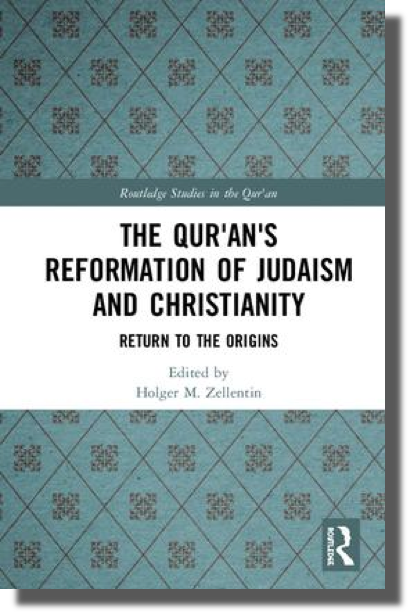
In the latest installment of the Review of Qur’anic Research (vol. 6, no.2), Sidney H. Griffith (The Catholic University of America) reviews Holger M. Zellentin’s (ed.), The Qur’an’s Reformation of Judaism and Christianity: Return to the Origins (London & New York: Routledge, 2019).
 In his review, Griffith writes “The title of this important collection of scholarly articles already gives away the hypothesis the editor intends the dozen, first rate studies of qurʾānic passages included in the volume to commend. Namely, the view that one might best understand the Arabic scripture’s relationship with contemporary Judaism and Christianity by recognizing, as he says, “the Qur’an’s attempt to reform rather than to replace the religion of the Jews and the Christians of its time.” (3). This characterization of the Qurʾān’s purpose is already debatable, albeit that one readily recognizes that the text does envision the continuing existence of the “Scripture People” within its purview, whose beliefs and practices are nevertheless criticized and whose social well-being is subjected to demeaning restrictions (Q al-Tawbah 9:29). The problem is that in several Medinan passages the Qurʾān explicitly distinguishes between “Those who believe, those who practice Judaism, and the Nazarenes (i.e., the Christians)” (Q al-Baqarah 2:62; Q al-Māʾidah 5:69; Q al-Ḥajj 22:17). It would seem that the Qurʾān really does commend replacement rather than just reformation on the basis of shared narratives. One suspects that in speaking of “reformation” in the present context, a term that readily suggests comparison with a major event in western Christianity of later times, the intention is to highlight the fact of the Qurʾān’s dialogue with Jews and Christians in the milieu of its origins, and to suggest familiarity with Jewish and Christian narratives of shared biblical and non-biblical figures, which the Qurʾān re-configures to fit its own, differing construction of revelatory meaning…”
In his review, Griffith writes “The title of this important collection of scholarly articles already gives away the hypothesis the editor intends the dozen, first rate studies of qurʾānic passages included in the volume to commend. Namely, the view that one might best understand the Arabic scripture’s relationship with contemporary Judaism and Christianity by recognizing, as he says, “the Qur’an’s attempt to reform rather than to replace the religion of the Jews and the Christians of its time.” (3). This characterization of the Qurʾān’s purpose is already debatable, albeit that one readily recognizes that the text does envision the continuing existence of the “Scripture People” within its purview, whose beliefs and practices are nevertheless criticized and whose social well-being is subjected to demeaning restrictions (Q al-Tawbah 9:29). The problem is that in several Medinan passages the Qurʾān explicitly distinguishes between “Those who believe, those who practice Judaism, and the Nazarenes (i.e., the Christians)” (Q al-Baqarah 2:62; Q al-Māʾidah 5:69; Q al-Ḥajj 22:17). It would seem that the Qurʾān really does commend replacement rather than just reformation on the basis of shared narratives. One suspects that in speaking of “reformation” in the present context, a term that readily suggests comparison with a major event in western Christianity of later times, the intention is to highlight the fact of the Qurʾān’s dialogue with Jews and Christians in the milieu of its origins, and to suggest familiarity with Jewish and Christian narratives of shared biblical and non-biblical figures, which the Qurʾān re-configures to fit its own, differing construction of revelatory meaning…”
Want to read more? For full access to the Review of Qur’anic Research (RQR), members can log in HERE. Not an IQSA member? Join today to enjoy RQR and additional member benefits!
© International Qur’anic Studies Association, 2020. All rights reserved.
